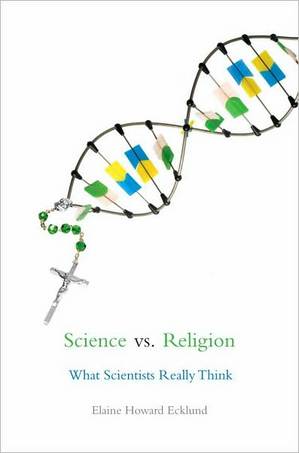Science vs. religion: What do scientists really think?

But wait! Are religion and science really enemies? Are they truly opposed worldviews? That’s the common belief.
This week, you might be surprised to learn that there are many people of faith among scientists at our nation’s elite universities, according to a new study by sociologist Elaine Howard Ecklund. This is the first comprehensive study of what scientists really think about religion. She studied both natural scientists (physicists, chemists, and so on) and social scientists (such as yours truly, a sociologist). I wasn’t interviewed in her study, but she did talk with sociologists at the University of Michigan. And, I had the pleasure of meeting Elaine after her book was published and we talked about her findings.
Now, it is true, Elaine learned, that more than half of elite scientists do not claim any religious affiliation, while most Americans do. But is the glass half empty or half full? If we assume science and religion are mortal enemies, it is notable that half do indeed claim a religious affiliation. As she notes in her new book “Science vs. Religion,” the greatest denominational similarities between scientists and the general public are mainline Protestants and Catholics. Scientists identify with these religious denominations in about the same proportions as the general public.
But very few scientists are evangelical Protestants, she finds. And, there are more Jewish scientists than the proportion of Jews in the American population. There are also more Buddhist and Hindu scientists, relative to their proportions in the population.
Surprised? This week on OurValues.org, we’ll explore the key findings from this landmark study. Stay tuned. More surprises in store.
Dr. Wayne E. Baker is a sociologist on the senior faculty of the University of Michigan Ross School of Business. He specializes in researching the core beliefs and desires that motivate and shape American culture. Occasionally, Dr. Baker will share with AnnArbor.com readers a series of faith-related discussions from his blog, Our Values. He can be reached at ourvaluesproject@gmail.com


Comments
Freemind42
Mon, Jun 7, 2010 : 2:53 p.m.
well said atnaap. Personally, I would hope that our leading scientists were not religious people. Religion teaches obedience and the practice of dogma of assumed truth, whereas science is supposed to teach you to criticize and try to disprove what is the assumed truth. They are diametrically opposed perspectives of problem solving.
theodynus
Mon, Jun 7, 2010 : 7:58 a.m.
"Is the glass half empty or half full?" Seems like the implication here is that there's something wrong with the half of scientists who don't believe in magic.